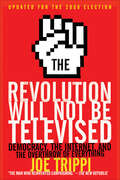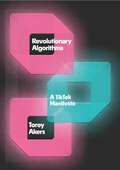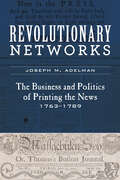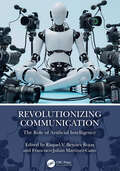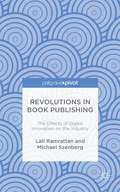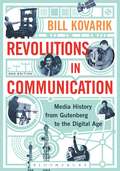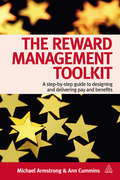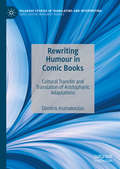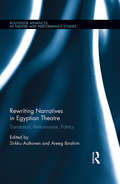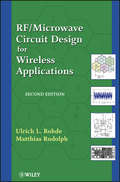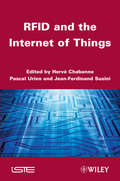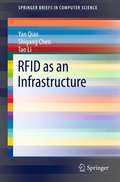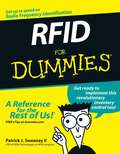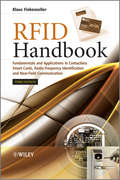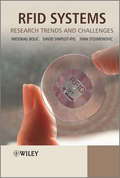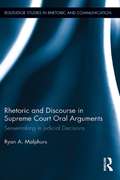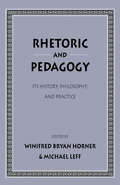- Table View
- List View
The Revolution Will Not Be Televised: Democracy, the Internet, and the Overthrow of Everything
by Joe TrippiIn a blend of Wired magazine and The Boys on the Bus, the man who invented Internet politics tells the story of how it was done and reveals how every sector can benefit from tech revolution.Campaign manager Joe Trippi, who signed on to run Howard Dean’s campaign when there was less than $100,000 in the till and fewer than 500 people involved, transformed the most obsure candidate in the field into the Democratic frontrunner and all-but-coronated party nominee in less than a year. The secret of Trippi’s off-the-charts success: a revolutionary use of the Internet, and an impassioned, contagious desire to overthrow politics-as-usual. Before Dean knew it, he had a groundswell of 600,000 Americans behind him, was leading in every poll, and had raised $45 million—more money than any Democrat in history. We now know that unprecedented fundraising, unheard-of numbers of people checking in on the Internet, chatting on blogs, reaching out to their fellow voters and showing up at house parties really can compete with—and in so many ways exceed— the more traditional approaches to winning in politics. But the why’s and how’s leave much fertile ground to plow, and for the first time, Trippi, an icon to all the Dean supporters he energized, is sharing his lessons learned, along with colorful behind-the-scenes stories from the campaign trail. Perhaps lulled by the bust of the dot.com boom, many have dismissed the Internet as old news. But if Dean’s campaign wasn’t enough of a wake-up call, this book is: Trippi reveals just how the sleeping power of technology can be harnessed, and illuminates how every organization and individual in America can benefit from the tidal wave of change on the horizon.
Revolutionary Algorithms: A TikTok Manifesto
by Torey AkersFrom an artist and TikTok creator, a critical look at the controversial app and its effect on cultural heritage, artificial intelligence, community organizing, and digital censorship. In Revolutionary Algorithms, Torey Akers approaches TikTok with a deep understanding of the app, as both a prolific creator and consumer of its content. In these essays, she interrogates how the TikTok ban and the multiple genocides happening around the world are deeply intertwined; how the app can empower creators, amplify social movements, and document abuses of power. She addresses the good, bad, and sometimes uncanny parts of maneuvering and communicating in a digital space. As a new era of social media looms, Akers makes the case for techno-progressivism, looking toward a future where TikTok continues to connect, inspire, and create space for more intersectionality, equity, and joy.
Revolutionary Networks: The Business and Politics of Printing the News, 1763–1789 (Studies in Early American Economy and Society from the Library Company of Philadelphia)
by Joseph M. AdelmanAn engrossing and powerful story about the influence of printers, who used their commercial and political connections to directly shape Revolutionary political ideology and mass mobilization.Honorable Mention, St. Louis Mercantile Library Prize, Bibliographical Society of AmericaDuring the American Revolution, printed material, including newspapers, pamphlets, almanacs, and broadsides, played a crucial role as a forum for public debate. In Revolutionary Networks, Joseph M. Adelman argues that printers—artisans who mingled with the elite but labored in a manual trade—used their commercial and political connections to directly shape Revolutionary political ideology and mass mobilization. Going into the printing offices of colonial America to explore how these documents were produced, Adelman shows how printers balanced their own political beliefs and interests alongside the commercial interests of their businesses, the customs of the printing trade, and the prevailing mood of their communities. Adelman describes how these laborers repackaged oral and manuscript compositions into printed works through which political news and opinion circulated. Drawing on a database of 756 printers active during the Revolutionary era, along with a rich collection of archival and printed sources, Adelman surveys printers' editorial strategies. Moving chronologically through the era of the American Revolution and to the war's aftermath, he details the development of the networks of printers and explains how they contributed to the process of creating first a revolution and then the new nation.By underscoring the important and intertwined roles of commercial and political interests in the development of Revolutionary rhetoric, this book essentially reframes our understanding of the American Revolution. Printers, Adelman argues, played a major role as mediators who determined what rhetoric to amplify and where to circulate it. Offering a unique perspective on the American Revolution and early American print culture, Revolutionary Networks reveals how these men and women managed political upheaval through a commercial lens.
Revolutionary News: The Press in France, 1789–1799
by Jeremy PopkinThe newspaper press was an essential aspect of the political culture of the French Revolution. Revolutionary News highlights the most significant features of this press in clear and vivid language. It breaks new ground in examining not only the famous journalists but the obscure publishers and the anonymous readers of the Revolutionary newspapers. Popkin examines the way press reporting affected Revolutionary crises and the way in which radical journalists like Marat and the Pere Duchene used their papers to promote democracy.
Revolutionizing Communication: The Role of Artificial Intelligence
by Benítez Rojas, Raquel V. Martínez-Cano, Francisco-JuliánRevolutionizing Communication: The Role of Artificial Intelligence explores the wide-ranging effects of artificial intelligence (AI) on how we connect and communicate, changing social interactions, relationships, and the very structure of our society. Through insightful analysis, practical examples, and knowledgeable perspectives, the book examines chatbots, virtual assistants, natural language processing, and more. It shows how these technologies have a significant impact on cultural productions, business, education, ethics, advertising, media, journalism, and interpersonal interactions.Revolutionizing Communication is a guide to comprehending the present and future of communication in the era of AI. It provides invaluable insights for professionals, academics, and everyone interested in the significant changes occurring in our digital age.
Revolutions in Book Publishing: The Effects of Digital Innovation on the Industry
by Lall Ramrattan Michael SzenbergRevolutions in Book Publishing uses dynamic methods to examine the evolution of the industry's transition from physical place to cyber space, analyzing the latest effects of technological innovations on the industry as well as their influence on distribution channels, market structure, and conduct of the industry.
Revolutions in Book Publishing: The Effects Of Digital Innovation On The Industry
by Michael Szenberg Lall RamrattanRevolutions In Communication: Media History From Gutenberg To The Digital Age
by Bill KovarikRevolutions in Communication offers a new approach to media history, presenting an encyclopedic look at the way technological change has linked social and ideological communities. Using key figures in history to benchmark the chronology of technical innovation, Kovarik's exhaustive scholarship narrates the story of revolutions in printing, electronic communication and digital information, while drawing parallels between the past and present. Updated to reflect new research that has surfaced these past few years, Revolutions in Communication continues to provide students and teachers with the most readable history of communications, while including enough international perspective to get the most accurate sense of the field. The supplemental reading materials on the companion website include slideshows, podcasts and video demonstration plans in order to facilitate further reading.
The Reward Management Toolkit: A Step-By-Step Guide to Designing and Delivering Pay and Benefits
by Michael Armstrong Ann ChapmanDeciding how to effectively reward staff is one of the most tricky and contentious areas in people management. Getting it right can help promote a motivated workforce, and significantly improve recruitment and retention. But how do you decided what pay scale is suitable for which job and how do you design reward packages which recognise contribution and encourage employees?The Reward Management Toolkit provides practical, step-by-step guidance on designing and delivering rewards across organizations. In each tool the authors describe what the tool will achieve and provide guidance on when it is appropriate to implement. Each tool is supported by questionnaires, checklists and opinion surveys which can be used as the basis for analysis, discussions in workshops, project teams and focus groups. These tools include: the design, development and implementation process, strategic reward, job evaluation, market rate analysis, benefits options, including flexible benefits and the management and evaluation of reward systems. Online supporting resources include figures and templates such as checklists and questionnaires.
Rewriting Humour in Comic Books: Cultural Transfer and Translation of Aristophanic Adaptations (Palgrave Studies in Translating and Interpreting)
by Dimitris AsimakoulasThis book examines comic book adaptations of Aristophanes’ plays in order to shed light on how and why humour travels across cultures and time. Forging links between modern languages, translation and the study of comics, it analyses the Greek originals and their English translations and offers a unique, language-led research agenda for cultural flows, and the systematic analysis of textual norms in a multimodal environment. It will appeal to students and scholars of Modern Languages, Translation Studies, Comics Studies, Cultural Studies and Comparative Literature.
Rewriting, Manipulation and Translator Subjectivity: Translating Chinese Literature in a Global Context (Palgrave Studies in Translating and Interpreting)
by Hu LiuThis book presents an in-depth analysis of Howard Goldblatt’s translation of Mo Yan’s Life and Death Are Wearing Me Out (L&D). It explores how Goldblatt translates the original novel under the influence of three major manipulative powers: poetics, ideology and patronage, as well as his own subjectivity (translator subjectivity), to achieve his objectives as a literary translator. The author analyses both the translation and its paratext to gain a more complete understanding of Goldblatt’s accomplishments, and examines how Goldblatt rewrites the original text under the influence of various patronage factors, such as the original author, publisher, editor, market expectancy, literary collaborator, and the target reader. This book provides a comprehensive picture of the production, reception and dissemination of Goldblatt’s translation, exposing the motivations behind his translation in full measure, and it will be of interest to students and scholars of Translation Studies, Comparative Literature and Literary Studies, and Chinese Culture and Literature.
Rewriting Narratives in Egyptian Theatre: Translation, Performance, Politics (Routledge Advances in Theatre & Performance Studies)
by Sirkku Aaltonen Areeg IbrahimThis study of Egyptian theatre and its narrative construction explores the ways representations of Egypt are created of and within theatrical means, from the 19th century to the present day. Essays address the narratives that structure theatrical, textual, and performative representations and the ways the rewriting process has varied in different contexts and at different times. Drawing on concepts from Theatre and Performance Studies, Translation Studies, Cultural Studies, Postcolonial Studies, and Diaspora Studies, scholars and practitioners from Egypt and the West enter into dialogue with one another, expanding understanding of the different fields. The articles focus on the ways theatre texts and performances change (are rewritten) when crossing borders between different worlds. The concept of rewriting is seen to include translation, transformation, and reconstruction, and the different borders may be cultural and national, between languages and dramaturgies, or borders that are present in people’s everyday lives. Essays consider how rewritings and performances cross borders from one culture, nation, country, and language to another. They also study the process of rewriting, the resulting representations of foreign plays on stage, and representations of the Egyptian revolution on stage and in Tahrir Square. This assessment of the relationship between theatre practices, exchanges, and rewritings in Egyptian theatre brings vital coverage to an undervisited area and will be of interest to developments in theatre translation and beyond.
RF Antenna Beam Forming: Focusing and Steering in Near and Far Field
by Shun-Ping Chen Heinz SchmiedelThis book is designed for both the scientific audience, research and development engineers and the university students. The fundamentals of radio frequency antenna beam forming is explained in this book. The principles of beam focusing and beam steering in near field and far field are visualized with 2D and 3D simulations and compared with measurement results. Besides linear and planar antenna arrays, also conformal arrays, i.e. concave and convex antenna arrays, suitable for certain applications, are investigated and presented. Also related applications of radio frequency beam forming like open loop and closed loop large scale antenna arrays or massive MIMO, which is one of the break-through technologies for 5G and future 6G and involves an extremely large number of antenna elements for the multi-user beam forming, as well as thinned antenna arrays with electrically large distances between the antenna elements are discussed.
RF Antenna Beam Forming: Focusing and Steering in Near and Far Field
by Shun-Ping Chen Heinz SchmiedelThis book is designed for both the scientific audience, research and development engineers and university students. The fundamentals of radio frequency antenna beam forming are explained in this book. The principles of beam focusing and beam steering in near field and far field are visualized with 2D and 3D simulations and compared with measurement results. Besides linear and planar antenna arrays, also conformal arrays, i.e. concave and convex antenna arrays, suitable for certain applications, are investigated and presented. Also related applications of open loop and closed loop beam forming, and massive MIMO, which is one of the break-through technologies for 5G and future 6G and involves an extremely large number of antenna elements for the multi-user beam forming, are discussed in detail. Also covered are large scale antenna arrays as well as thinned antenna arrays with electrically large distances between the antenna elements.
RF, Microwave and Millimeter Wave Technologies (Signals and Communication Technology)
by E. S. Gopi Hemant KumarThis book provides in-depth exposure to emerging technologies and recent advancements in RF, Microwave, and Millimetre Wave Technologies. The book covers the basic concepts along with the recent advancements in designing and developing antennas and circuits for the latest technologies. The concepts of mode compression, Full Duplex communication, massive MIMO, frequency selective surfaces, reflectarrays, and metasurfaces have been discussed in detail. Various types of antennas, such as electrically small antennas, textile antennas, dielectric resonator antennas, etc., to be used for the latest wireless devices, RFID applications are also thoroughly explored. The concept of machine learning to develop data-driven models for antenna design is also discussed briefly to provide readers with an introduction to the ML algorithms. The readers will be able to understand the theoretical concepts and practical design aspects of various antennas, high-frequency circuits, and device modeling. The target audience includes but is not limited to undergraduates, post-graduates, research scholars, academicians, scientists, and professionals who are interested in getting the latest knowledge in the field of RF, Microwave, and Millimetre Wave Technologies.
RF / Microwave Circuit Design for Wireless Applications
by Ulrich L. Rohde Matthias RudolphProvides researchers and engineers with a complete set of modeling, design, and implementation tools for tackling the newest IC technologiesRevised and completely updated, RF/Microwave Circuit Design for Wireless Applications, Second Edition is a unique, state-of-the-art guide to wireless integrated circuit design that provides researchers and engineers with a complete set of modeling, design, and implementation tools for tackling even the newest IC technologies. It emphasizes practical design solutions for high-performance devices and circuitry, incorporating ample examples of novel and clever circuits from high-profile companies.Complete with excellent appendices containing working models and CAD-based applications, this powerful one-stop resource:Covers the entire area of circuit design for wireless applicationsDiscusses the complete system for which circuits are designed as well as the device technologies on which the devices and circuits are basedPresents theory as well as practical issuesIntroduces wireless systems and modulation typesTakes a systematic approach that differentiates between designing for battery-operated devices and base-station designRF/Microwave Circuit Design for Wireless Applications, Second Edition is an indispensable tool for circuit designers; engineers who design wireless communications systems; and researchers in semiconductor technologies, telecommunications, and wireless transmission systems.
RF Power Semiconductor Generator Application in Heating and Energy Utilization
by Nick Serpone Satoshi HorikoshiThis is a specialized book for researchers and technicians of universities and companies who are interested in the fundamentals of RF power semiconductors, their applications and market penetration.Looking around, we see that products using vacuum tube technology are disappearing. For example, branch tube TVs have changed to liquid crystal TVs, and fluorescent light have turned into LED. The switch from vacuum tube technology to semiconductor technology has progressed remarkably. At the same time, high-precision functionalization, miniaturization and energy saving have advanced. On the other hand, there is a magnetron which is a vacuum tube device for generating microwaves. However, even this vacuum tube technology has come to be replaced by RF power semiconductor technology. In the last few years the price of semiconductors has dropped sharply and its application to microwave heating and energy fields will proceed. In some fields the transition from magnetron microwave oscillator to semiconductor microwave oscillator has already begun. From now on this development will progress remarkably. Although there are several technical books on electrical systems that explain RF power semiconductors, there are no books yet based on users' viewpoints on actual microwave heating and energy fields. In particular, none have been written about exact usage and practical cases, to answer questions such as "What are the advantages and disadvantages of RF power semiconductor oscillator?", "What kind of field can be used?" and the difficulty of the market and application. Based on these issues, this book explains the RF power semiconductors from the user's point of view by covering a very wide range of fields.
RFID and the Internet of Things
by Hervé Chabanne Pascal Urien Jean-Ferdinand SusiniRFID (Radio Frequency Identification) technology allows for automatic identification of information contained in a tag by scanning and interrogation using radio frequency (RF) waves. An RFID tag contains an antenna and a microchip that allows it to transmit and receive. This technology is a possible alternative to the use of barcodes, which are frequently inadequate in the face of rapid growth in the scale and complexity of just-in-time inventory requirements, regional and international trade, and emerging new methods of trade based on it. Use of RFID tags will likely eventually become as widespread as barcodes today. This book describes the technologies used for implementation of RFID: from hardware, communication protocols, cryptography, to applications (including electronic product codes, or EPC) and middleware. The five parts of this book will provide the reader with a detailed description of all the elements that make up a RFID system today, including hot topics such as the privacy concerns, and the Internet of Things.
RFID as an Infrastructure
by Yan Qiao Tao Li Shigang ChenRFID (radio frequency identification) tags are becoming ubiquitously available in object tracking, access control, and toll payment. The current application model treats tags simply as ID carriers and deals with each tag individually for the purpose of identifying the object that the tag is attached to. The uniqueness of RFID as an Infrastructure is to change the traditional individual view to a collective view that treats universally-deployed tags as a new infrastructure, a new wireless platform on which novel applications can be developed. The book begins with an introduction to the problems of tag estimation and information collection from RFID systems, and explains the challenges. It discusses how to efficiently estimate the number of tags in a large RFID system, considering both energy cost and execution time. It then gives a detailed account on how to collect information from a sensor-augmented RFID network with new designs that significantly reduce execution time.
RFID Design Fundamentals and Applications
by Albert Lozano-NietoRFID is an increasingly pervasive tool that is now used in a wide range of fields. It is employed to substantiate adherence to food preservation and safety standards, combat the circulation of counterfeit pharmaceuticals, and verify authenticity and history of critical parts used in aircraft and other machinery—and these are just a few of its uses. Goes beyond deployment, focusing on exactly how RFID actually works RFID Design Fundamentals and Applications systematically explores the fundamental principles involved in the design and characterization of RFID technologies. The RFID market is exploding. With new and enhanced applications becoming increasingly integral to government and industrial chain supply and logistics around the globe, professionals must be proficient in the evaluation and deployment of these systems. Although manufacturers provide complete and extensive documentation of each individual RFID component, it can be difficult to synthesize and apply this complex information—and users often must consult and integrate data from several producers for different components. This book covers topics including: Types of antennas used in transponders Components of the transponder, memory structure and logic circuits Antennae for RFID interrogators Types of modulation Organization and characteristics of commercial transponders Communication links Modes of operation for transponders operating at different frequencies Principles of arbitration and anti-collision Commands used by transponders This powerful reference helps to resolve this dilemma by compiling a systematic overview of the different parts that make up the whole RFID system, helping the reader develop a clear and understanding of its mechanisms and how the technology actually works. Most books on RFID focus on commercial use and deployment of the technology, but this volume takes a different and extremely useful approach. Directed toward both professionals and students in electronics, telecommunications, and new technologies, it fills the informational void left by other books, illustrating specific examples of available semiconductors and integrated circuits to clearly explain how RFID systems are configured, how they work, and how different system components interact with each other.
RFID For Dummies
by Patrick J. Sweeney IiMany companies have asked suppliers to begin using RFID (radio frequency identification) tags by 2006 RFID allows pallets and products to be scanned at a greater distance and with less effort than barcode scanning, offering superior supply-chain management efficiencies This unique plain-English resource explains RFID and shows CIOs, warehouse managers, and supply-chain managers how to implement RFID tagging in products and deploy RFID scanning at a warehouse or distribution center Covers the business case for RFID, pilot programs, timelines and strategies for site assessments and deployments, testing guidelines, privacy and regulatory issues, and more
RFID Handbook
by Klaus Finkenzeller Dörte MüllerThis is the third revised edition of the established and trusted RFID Handbook; the most comprehensive introduction to radio frequency identification (RFID) available.This essential new edition contains information on electronic product code (EPC) and the EPC global network, and explains near-field communication (NFC) in depth. It includes revisions on chapters devoted to the physical principles of RFID systems and microprocessors, and supplies up-to-date details on relevant standards and regulations.Taking into account critical modern concerns, this handbook provides the latest information on:the use of RFID in ticketing and electronic passports; the security of RFID systems, explaining attacks on RFID systems and other security matters, such as transponder emulation and cloning, defence using cryptographic methods, and electronic article surveillance; frequency ranges and radio licensing regulations. The text explores schematic circuits of simple transponders and readers, and includes new material on active and passive transponders, ISO/IEC 18000 family, ISO/IEC 15691 and 15692. It also describes the technical limits of RFID systems.A unique resource offering a complete overview of the large and varied world of RFID, Klaus Finkenzeller's volume is useful for end-users of the technology as well as practitioners in auto ID and IT designers of RFID products. Computer and electronics engineers in security system development, microchip designers, and materials handling specialists benefit from this book, as do automation, industrial and transport engineers. Clear and thorough explanations also make this an excellent introduction to the topic for graduate level students in electronics and industrial engineering design.Klaus Finkenzeller was awarded the Fraunhofer-Smart Card Prize 2008 for the second edition of this publication, which was celebrated for being an outstanding contribution to the smart card field.
RFID Systems
by Miodrag Bolic Ivan Stojmenovic David Simplot-RylThis book provides an insight into the 'hot' field of Radio Frequency Identification (RFID) SystemsIn this book, the authors provide an insight into the field of RFID systems with an emphasis on networking aspects and research challenges related to passive Ultra High Frequency (UHF) RFID systems. The book reviews various algorithms, protocols and design solutions that have been developed within the area, including most recent advances. In addition, authors cover a wide range of recognized problems in RFID industry, striking a balance between theoretical and practical coverage. Limitations of the technology and state-of-the-art solutions are identified and new research opportunities are addressed. Finally, the book is authored by experts and respected researchers in the field and every chapter is peer reviewed.Key Features:Provides the most comprehensive analysis of networking aspects of RFID systems, including tag identification protocols and reader anti-collision algorithms Covers in detail major research problems of passive UHF systems such as improving reading accuracy, reading range and throughput Analyzes other "hot topics" including localization of passive RFID tags, energy harvesting, simulator and emulator design, security and privacy Discusses design of tag antennas, tag and reader circuits for passive UHF RFID systems Presents EPCGlobal architecture framework, middleware and protocols Includes an accompanying website with PowerPoint slides and solutions to the problems http://www.site.uottawa.ca/~mbolic/RFIDBook/This book will be an invaluable guide for researchers and graduate students in electrical engineering and computer science, and researchers and developers in telecommunication industry.
Rhetoric and Discourse in Supreme Court Oral Arguments: Sensemaking in Judicial Decisions (Routledge Studies in Rhetoric and Communication)
by Ryan MalphursWhile legal scholars, psychologists, and political scientists commonly voice their skepticism over the influence oral arguments have on the Court’s voting pattern, this book offers a contrarian position focused on close scrutiny of the justices’ communication within oral arguments. Malphurs examines the rhetoric, discourse, and subsequent decision-making within the oral arguments for significant Supreme Court cases, visiting their potential power and danger and revealing the rich dynamic nature of the justices’ interactions among themselves and the advocates. In addition to offering advancements in scholars’ understanding of oral arguments, this study introduces Sensemaking as an alternative to rational decision-making in Supreme Court arguments, suggesting a new model of judicial decision-making to account for the communication within oral arguments that underscores a glaring irony surrounding the bulk of related research—the willingness of scholars to criticize oral arguments but their unwillingness to study this communication. With the growing accessibility of the Court’s oral arguments and the inevitable introduction of television cameras in the courtroom, this book offers new theoretical and methodological perspectives at a time when scholars across the fields of communication, law, psychology, and political science will direct even greater attention and scrutiny toward the Supreme Court.
Rhetoric and Pedagogy: Its History, Philosophy, and Practice: Essays in Honor of James J. Murphy (Rhetoric And Public Affairs Ser.)
by Winifred Bryan Horner Michael LeffTo provide a view of the history of western rhetoric, this volume presents original articles by a number of world-renowned scholars representing different countries and varying viewpoints. In discussing the status of the historical perspectives on rhetoric, these international scholars also present a tribute to James J. Murphy, whose scholarship and service did much to shape the field. The book will introduce new insights into western European rhetoric and its connections with English rhetoric.
